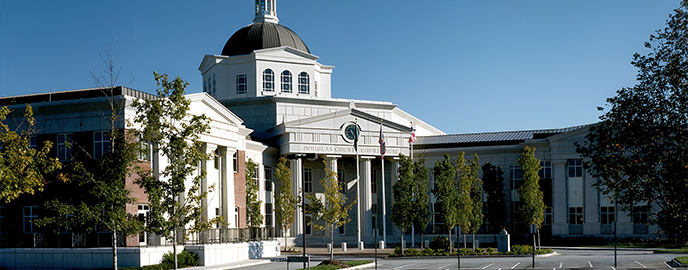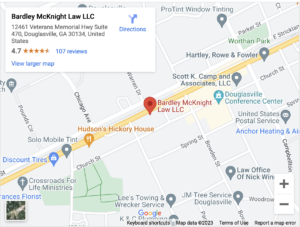
Have you and your same-sex spouse decided to file for divorce in Douglasville, GA? The divorce process can be messy, even under the best circumstances. LGBTQ relationships often involve additional complications.
An experienced Douglasville LGBT divorce lawyer at Bardley McKnight Law Divorce Lawyers can help you navigate any challenge you may face. In fact, we have dedicated our entire practice to helping clients navigate complex family law issues.
Our compassionate team is here to help in any way we can. Contact our law offices in Douglasville, Georgia, or call (470) 308-5409 today to learn more about this area of law and how our attorneys can protect your rights.
How Can Bardley McKnight Law Divorce Lawyers Help With My LGBT Divorce Issues in Douglasville, GA?

Deciding to file for divorce is rarely easy. The process can become much more difficult when issues are contested. Even if your situation is amicable, you want to make sure you get the legal issues right.
LBGT relationships often have unique characteristics. Our experienced Douglasville family law attorneys have the skills to help your family reach a favorable outcome.
When you hire Bardley McKnight Law Divorce Lawyers to protect you, you’ll gain a trusted advocate who will:
- Provide sound legal advice and guidance throughout the legal process
- Help you understand your legal rights and options
- Demand full financial disclosures from your spouse
- Handle all paperwork necessary to complete your divorce
- Gather evidence as necessary to establish your rights under Georgia law
- Contact private investigators and other experts as necessary
- Handle all communications with your spouse, their lawyer, and the courts
- Advocate to protect your rights in family court
It’s never too early to understand your legal options. Contact our Douglasville family lawyers to learn more about our experience and how our family law firm can help today.
Overview of the LGBT Divorce Laws in Georgia
As you know, the U.S. Supreme Court legalized same-sex marriage in all 50 U.S. states back in 2015. From a legal standpoint, same-sex marriage in Georgia is no different than a heterosexual marriage.
In other words, the process for obtaining a legal divorce is no different for LGBT couples.
While there are issues that must be resolved in all divorce cases, same-sex couples often encounter complications that heterosexual couples do not experience.
Only a few local governments in Georgia recognize domestic partnerships (Douglas County is not one of them). Still, it’s possible that you may have entered a domestic partnership agreement before Obergefell v. Hodges became the law of the land. If that’s the case, your domestic partnership or civil union may need to be dissolved.
Child custody and support arrangements can also be complicated if one parent is the child’s biological parent and the other has not legally adopted the child.
Our Lawyers Will Help With All Issues Related to Your LGBT Divorce in Douglasville, Georgia
Our lawyers can help with all of the issues you must resolve before your divorce is finalized in Georgia, including:
- Prenuptial agreements
- Child custody and visitation
- Child support
- Spousal support
- Division of your marital assets
Our lawyers in Douglasville know that each client’s unique circumstances will dictate the types of legal support they will require. We understand the complex and intricate issues that your family may face.
Even if you think your divorce will be amicable, emotions tend to run high when dealing with sensitive family matters. Securing legal representation can increase your chances of getting the most positive outcome possible.
To learn more about how Bardley McKnight Law Divorce Lawyers can help you through this difficult time, call to arrange a consultation with one of our lawyers today.
What Are the Grounds for LGBT Divorce in Douglasville, GA?
The State of Georgia recognizes several different legal grounds for obtaining a divorce.
Examples of those grounds for a contested divorce include:
- Adultery by either party after they are married
- Mental incompetency at the time of the marriage
- Fraud, duress, or coercion in obtaining the marriage
- Desertion or abandonment for at least one year
- Impotence at the time of the marriage
- Habitual intoxication
- Conviction of a crime involving moral turpitude, if the convicted spouse is sentenced to prison for two years or longer
- Pregnancy by another person
- Incest
- Cruel treatment
- Incurable mental illness
Like other states, Georgia also gives married couples the option of obtaining a no-fault divorce. If both parties agree that the marriage is “irretrievably broken,” you can obtain an uncontested divorce without the need to specify one of the enumerated grounds. However, courts will not grant a no-fault divorce until at least 30 days after your spouse has been served with divorce papers.
If you’re filing for divorce based on fault, you must present evidence to prove the asserted grounds do exist.
How Can Domestic Violence Impact an LGBT Divorce in Georgia?
Domestic violence can significantly impact the divorce process. Perpetrators of domestic violence often seek to exercise power over the abused spouse. These types of power-play dynamics may continue through the divorce process–making it much more difficult to resolve critical issues in an amicable manner.
Our lawyers know how to handle these sensitive issues. We have the experience necessary to keep the divorce process running smoothly. If you have been a victim, we can also help you obtain a protective order to keep your family safe.
That protective order can:
- Prevent your abusive spouse from contacting you or your children in any way
- Keep the abusive spouse from visiting your home, work, and school
- Allow you to remain in the family home while the divorce proceedings continue
- Grant you the right to receive temporary financial support
It’s also possible that your spouse has falsely accused you of committing acts of violence. If that’s the case, our attorneys can defend you against any unfounded allegations.
We know how complex and stressful filing for divorce can be. We’re here to help in any way we can, so call to speak with our Douglasville divorce lawyers today.
How Is Property Divided in a Douglasville LGBT Divorce?
In the marital context, there are two types of property recognized by Georgia courts: separate property and marital property. Of course, marital property is property acquired during the marriage. Separate property is property acquired before you married your spouse.
Under Georgia law, marital property must be divided equitably between the two spouses–remembering that “equitable” does not always mean “equal.”
LGBT couples may face unique issues when it comes to dividing assets and debts. Maybe you lived with your partner for decades before legally marrying. Maybe you entered a domestic partnership during that time. As a domestic partner, you’re not legally obligated to pay the debts incurred in your partner’s name (unlike a spouse, who may be held liable for their spouse’s debts).
Our lawyers know how to help you handle these and other complications. We’re skilled mediators and have the knowledge to help you reach a favorable solution.
Am I Entitled to Spousal Support or Alimony?
Spousal support is also referred to as “alimony” or “spousal maintenance.”
Courts consider many different factors when determining whether to award spousal support to a divorcing spouse, including:
- The duration of the marriage
- The income disparity between the two spouses
- Whether one party gave up opportunities for financial success to support the family in other ways
- Whether any grounds for divorce existed
While either spouse can be ordered to provide spousal support, courts most often award alimony to a lower-earning spouse who has relied on a partner during a lengthy relationship.
Child Support and Child Custody in LGBT Divorce Cases
Issues pertaining to children are one of the most complicated areas of LGBT divorce. As in any other case, courts make these decisions based on what is in the “best interests of the child.”
While joint custody is preferable, when two parents cannot reach an agreement, courts will consider many different factors when determining which parent is granted custody, including:
- The physical safety and well-being of the child
- The love and emotional ties between the child and parents, as well as the child and siblings and other family members
- The child’s need for stability
- Each parent’s ability to devote parenting time to the child, considering work obligations
- The child’s ties to the community
- The child’s own preferences
- The mental and physical health of all parties
- Any history of violence or substance abuse
While these factors are important in every case, when LGBT couples petition for divorce, some judges may be biased in favor of the child’s biological parent–and assign greater weight to that factor.
Hiring an experienced family lawyer is the best way to protect your family. Contact our LGBT family law team at Bardley McKnight Law Divorce Lawyers to learn more about how we can help today.
Contact an Experienced Douglasville LGBT Divorce Lawyer for Help Protecting Your Legal Rights Today
If you’re considering a same-sex divorce in Douglasville, you deserve to understand your legal rights and options. Bardley McKnight Law Divorce Lawyers has the knowledge you need to get your family through this tough time. To discuss your case with a Douglasville LGBT divorce lawyer, contact us today to arrange a meeting.

